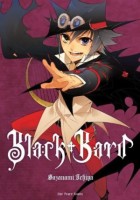 Creator: Ichiya Sazanami
Creator: Ichiya Sazanami
U.S. publisher: One Peace Books
ISBN: 9781935548386
Released: November 2013
Original release: 2011-2012
Ichiya Sazanami’s Black Bard was originally published in Japan between 2011 and 2012 in three individual volumes. The English-language edition of Black Bard, released in 2013 by One Peace Books, is a single-volume omnibus with newly created cover art. I wasn’t previously familiar with Sazanami’s work and for good reason–Black Bard was not only his debut manga in English, it was also his first series to be released in Japan after winning the Media Factory Manga Award in 2011. Black Bard was initially serialized in Media Factory’s manga magazine Monthly Comic Gene which is frequently described as publishing shōnen manga for a shōjo fanbase. I haven’t been following the magazine or Sazanami very closely, but the licensing of Black Bard caught my attention for a couple of reasons: one, I generally tend to find One Peace Books’ offerings rather interesting, and two, I can’t resist the combination of music and magic.
Traveling from town to town is a somewhat sullen young man, a wandering minstrel known only as Black Bard. He is famous for his wonderful singing voice; it would not be an exaggeration to call his performances magical. Black Bard enjoys the freedom (and coin) his songs have allowed him as well as the happiness he is able to bring to others through them. Even so, he tries to keep his distance and there are very few people who would dare to call Black Bard their friend. There is Snow-Snow, a young huntress who greatly admires Black Bard and his knowledge of the world, and Windy, a traveling merchant and beast man who first met him when they were children, but Black Bard even discourages their friendship. But now that a powerful organization is interested in Black Bard, his magic song, and the past he’s tried to keep hidden, he needs friends more than ever. Not that he would admit it.
The music aspect of Black Bard was definitely one of the major draws of the manga for me. Black Bard describes himself as a mere musician, but there is undeniably magic in his song. He claims not to cast enchantments, but his music does affect others even when he is not deliberately trying to do so. Of course there are the times that Black Bard very intentionally uses the power of his music to alter reality and manipulate other people. Somewhat surprisingly, by the end of the series Black Bard has almost turned into a battle manga. Music is a significant part of those fights. But in addition to a form of magic, music’s role in Black Bard is also of a more traditional sort. The power of music, both magical and otherwise, provides comfort and brings people together. It is used as a way to convey stories and express emotion, and as a way to keep legends and history from being forgotten.
While it isn’t without its flaws, I had a tremendous amount of fun reading Black Bard. Admittedly, the world building is a mess and the story is all over the place, but I can’t deny that I enjoyed the manga. At first Black Bard seems to be episodic, but once Windy and Snow-Snow make their appearance the story starts to focus in on the Black Bard’s mysterious past. Granted, some of that backstory would have been more effective had it been revealed earlier in the manga and some things are never adequately explained. As the manga progresses, the references to Alice in Wonderland become increasingly prominent. However, those references don’t actually add much to Black Bard except to lend a few names and influence some of the character designs. In general, Black Bard is very attractive art-wise and is an entertaining mix of silliness and drama. I know that I would certainly be interested in reading more of Sazanami’s work.